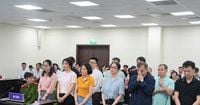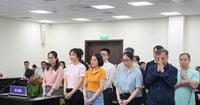On April 21, 2025, the Hanoi People's Court commenced the trial of Nguyễn Ngọc Phương, the Director of Phú Cường Gold Company, along with twelve other defendants. They face serious charges including "illegally transporting currency across borders," "violating regulations on banking operations," and "falsifying documents of agencies and organizations." The case, which has drawn significant attention, highlights a complex scheme involving multiple businesses and substantial sums of money.
Among the defendants is Phương's wife, Nguyễn Thị Hồng Nga, who is accused of being complicit in the illegal activities. However, she has been absent from the proceedings, having fled to South Korea in 2023 and currently being sought by authorities.
According to the indictment, from 2014 to 2018, Phương orchestrated a scheme that utilized both domestic and international enterprises to create fraudulent import contracts. These contracts were designed to legitimize bank loans, facilitate international payments, and enable the transfer of money abroad. The domestic companies involved included Phú Cường Gold Company, DPC Hanoi Company Limited, Giá Diệp Joint Stock Company, Lăng Nguyên International Joint Stock Company, DPC International Science and Technology Transfer Company Limited, Aqua-com Trading Investment Joint Stock Company, and Đông Đô Project Investment and Development Joint Stock Company.
On the international front, Phương established three companies in Hong Kong: Louis Alliance Company Limited, International Trading Hong Kong Limited, and Global Trading Service Limited. Through these entities, he directed employees to fabricate import contracts between the domestic businesses and the Hong Kong companies, effectively enabling the illegal transfer of funds.
The alleged scheme was multifaceted. It involved not only the creation of false import contracts but also the establishment of trading agreements between domestic entities to further legitimize loans and payments. This operation allowed Phương and his associates to transfer over 214 million USD abroad through 148 transactions, using various banks and financial institutions.
In addition to sending money out of Vietnam, Phương was also involved in bringing money back into the country. He allegedly used the same Hong Kong companies to funnel funds into personal accounts for himself and his wife, as well as for several of his domestic businesses. The total amount transferred back into Vietnam exceeded 212 million USD. These funds were then converted to Vietnamese Dong (VND) to service maturing bank loans and for personal expenditures.
The prosecution has identified Phương as the mastermind behind this extensive operation, asserting that he played a direct role in orchestrating the illegal transfers, which cumulatively exceed 426 million USD. The trial is expected to last for two days, with significant scrutiny on the methods employed by Phương and his associates.
During the proceedings, it was revealed that Phương directly coordinated with his subordinates, Phạm Thị Thu Thủy and Đinh Thị Diệu Thúy, who were tasked with calculating the necessary amounts for each credit contract and the corresponding funds to be transferred abroad. Thủy worked closely with bank officials to prepare loan applications and manage fund disbursements, while Thúy was responsible for creating false records to facilitate these transactions.
Thúy also played a crucial role in falsifying customs documents that were submitted to banks to validate the disbursement of funds and ensure compliance with international payment requirements. The scale of the operation has raised alarms within the Vietnamese financial system, prompting calls for stricter regulations and oversight in banking operations.
As the trial unfolds, the court will examine the extent of the defendants' involvement and the implications of their actions on the banking sector and the economy at large. Legal experts and financial analysts alike are watching closely, as this case could set a precedent for future enforcement against financial crimes in Vietnam.
With the prosecution presenting a strong case backed by substantial evidence, the defendants face a challenging road ahead. The outcome of this trial could have far-reaching consequences, not only for those involved but also for the regulatory landscape governing financial transactions in Vietnam.
In conclusion, the trial of Nguyễn Ngọc Phương and his associates underscores the ongoing challenges of combating financial crime and ensuring compliance within the banking sector. As the court proceedings continue, the focus will remain on accountability and the integrity of the financial system.





